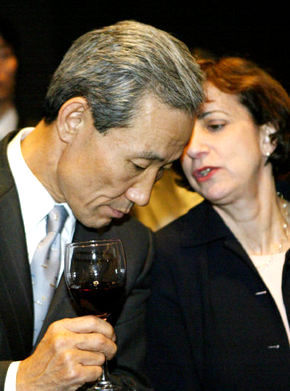 |
|
Top Korean delegate Kim Jong-hoon and his U.S. counterpart Wendy Cutler.
|
After a number of Korean concessions, trade agreement near, say observers
It is highly possible that South Korea and the United States will reach an agreement on a free trade deal, as negotiators from Seoul made a series of concessions on key issues during the 7th round of negotiations in Washington D.C. that ended on February 14. According to a core official of the South Korean delegation who spoke on condition of anonymity, the South Korean negotiators presented an amended proposal regarding the trade remedies section of the agreement to the U.S. side after concluding it would be impossible to achieve South Korean goals on issues that would require a change of U.S. laws. Washington has strongly opposed any demands from Seoul that would require any change in legislation; at the same time, however, legal experts say that many U.S. demands will require the alteration of Korean laws, perhaps even the Constitution. Regarding the automobile sector, South Korea agreed to establish a system to take into account the opinions of U.S. companies whenever Seoul revises regulations that could affect the industry, such as standards on safety or the environment, added the official. The two sides also discussed ways to see eye-to-eye on South Korea's special consumption tax and to reduce steps related to imposing automobile tariffs based on the size of a car's engine displacement.Seoul also accepted U.S. demands that South Korea allow U.S. financial firms which have branches in Korea to transfer Koreans' personal financial information overseas. Wendy Cutler, the U.S. chief negotiator, said that Kim Jong-hoon, her South Korean counterpart, came up with new and innovative ideas in connection with trade, and stressed that the negotiations had been very successful. In relation to the automotive sector, Cutler added that the teams had discussed the improvement of various non-tariff barriers, as well as tax reforms. In the meantime, the South Korean team said it had selected 100 out of 235 sensitive agricultural products for continued tarriff protection. As for the textile market, the U.S. presented its final proposal over high-tariff barriers and regulation of a product's place of origin. Kim, however, said that this proposal was not satisfactory to the South Korean side. On the 7th round of FTA negotiations overall, Cutler called them "the most successful negotiating round so far" and said that the round brought "substantial progress." Kim said, "I can't say that an agreement is imminent, but considering the progress of this round of negotiations, it will be possible to reach an agreement in proper time." The 8th round of talks will open in South Korea between March 8 and 12. The two sides want to conclude the negotiations by April 2, the deadline per the soon-to-expire U.S. Trade Promotion Authority (TPA), which allows trade deals to be passed more easily through Congress. Kim denied the claims made by a February 15 Hankyoreh report, which said that the nation is considering opening the market on some less sensitive rice products. Kim has maintained that Korea's rice market would remain untouched by an FTA with the U.S. President Roh Moo-hyun had a telephone conversation with U.S. President George Bush, during which they reconfirmed their commitment to the success of the trade talks, said presidential spokesperson Yoon Seung-yong. The two presidents agreed to allow the FTA delegations to demonstrate flexibility and take the initiative in seeking a mutually beneficial way of reaching an agreement in a timely manner, added Yoon. Please direct questions or comments to [englishhani@hani.co.kr]






